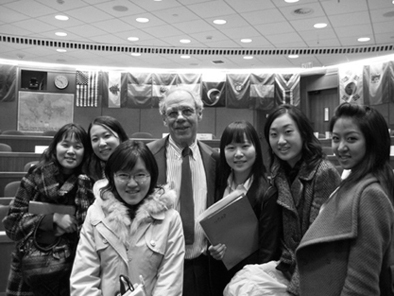
Ewha selected 10 students who were sent to Harvard from February 9 to 17 to participate in the
The program consists of two conferences, the first conference held at Harvard and the second one to be held at Ewha in March. “Ewha was chosen among the Korean university applicants as its proposed program had a good mixture of academic and cultural programs relating to this year’s topic, ‘Urban Planning & Sustainable Development’,” said Suh Young-ju the program manager of the Office of Global Affairs (OGA).
Ewha participants were selected by the OGA during last winter vacation. The students were evaluated according to their GPA (grade point average), TOEFL or TOEIC scores and an interview. “We considered more than just students’ academic ability. We chose students who could participate enthusiastically not only at the conference but also during the preparation time. Also, those who can easily share their thoughts with others and socialize well were valued,” said Suh.
Under the theme of “Urban Planning & Sustainable Development,” academic sessions, as well as cultural and social activities, were held throughout the First Conference convened at Harvard. “We prepared a bit more than a month for the conference. We were assigned to prepare two presentations, introducing Ewha and the city of
Most of the lectures were given by Harvard professors and some invited lecturers. Also, Ewha delegates had chances to participate in Harvard students’ extracurricular activities and feel the school’s atmosphere. “We had a chance to watch a Harvard debating group doing a mock debate, it was quite inspiring,” said Ham. Yu Ji-yung (International Studies, 2), who had a chance to participate in one of the activities said, “Harvard comedy club organized a comedy show for us. They prepared American jokes and asked us to participate, too.” According to Yu, she also experienced Jewish culture at Harvard. “Since there were many Jews attending Harvard, a Jewish dinner was organized for us where we sang a Jewish song and ate Jewish food,” said Yu.
Unlike students’ expectation of the program being very much academically focused, there were many interesting programs. “We had a party on campus one night and each participating team had to do a skit. We shared meeting, a Korean university student’s culture of a group blind date, and got a very positive response. When they come to
When the official schedule of the day ended, students mostly spent their time to make friends. “Most of the evenings, we spent time with Harvard delegates who will visit
After spending a week with Harvard students, Ewha students were inspired by their life patterns and ability. “I was surprised about Harvard students’ enthusiasm to study hard. There were students who study until two in the morning and wake up at five to study again,” said Yu. “I was so surprised to see students managing an enormous amount of study at the same time participating in so many extra-curricular activities. I think the multitasking ability is what it is special about Harvard students,” said Ham.
The Second Conference is going to be held at Ewha from March 22 to 30 under the same topic. Students who participated in the First Conference and 30 other selected students from Ewha will be given the opportunities to join. In the Second Conference, Harvard students are scheduled to come and learn more about

